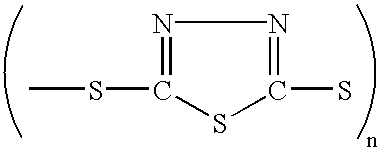Lithium battery and electrode
- Summary
- Abstract
- Description
- Claims
- Application Information
AI Technical Summary
Problems solved by technology
Method used
Image
Examples
example 1
[0075] Carbon Nanotubes
[0076] Firstly, aggregates of carbon nanotubes were disentangled. The aggregates of carbon nanotubes were added to 1-methyl-2-pyrrolidone to give a mixture containing 1 percent by weight of the carbon nanotubes. The mixture was added to a homogenizer under a trade name of ULTRA TALUX T-25 from IKA Japan Company Limited in Nakayama-ku, Yokohama, Japan. The homogenizer applied sheer force to the mixture, thereby disentangling the aggregate. The homogenizer has a structure of FIG. 1. In the homogenizer, the rotor may rotate 8,000 to 24,000 round per minute.
[0077] Secondly, we confirmed that aggregates of carbon nanotubes were disentangled by following procedures, which are not necessary in producing an electrode including the disentangled carbon nanotubes. To the liquid mixture thus obtained, which contains one part by weight of carbon nanotubes, was added 19 parts by weight of polymethylmethacrylate serving as a binder and further N-methyl-2-pyrrolidone for dilu...
example 2
[0088] Lithium Secondary Battery
[0089] A lithium secondary battery having a coin configuration was produced. The aforementioned battery precursor was cut to a disk configuration having a diameter of 16 mm and used as the cathode.
[0090] A gel electrolyte was obtained by a method as follows. To a mixture of 14.5 gram of propylene carbonate and 25.1 gram of ethylene carbonate was added 4.8 gram of lithium tetrafluoroborate. A powder of 5.0 gram of a copolymer of polyacrylonitrile and polymethylacrylate, which was commercially available from Scientific Polymer Product and has a weight average molecular weight of 100,000. The mixture thus obtained was stirred by magnetic stirrer for one day to obtain a polymeric dispersion having a white color. The polymeric dispersion was placed in a tray made of stainless steel, and heated to 125 degree Celsius to obtain a colorless dispersion. Meanwhile, onto a glass sheet was placed a pair of TEFLON sheets with a thickness of 0.5 mm at both ends of t...
PUM
 Login to View More
Login to View More Abstract
Description
Claims
Application Information
 Login to View More
Login to View More - R&D
- Intellectual Property
- Life Sciences
- Materials
- Tech Scout
- Unparalleled Data Quality
- Higher Quality Content
- 60% Fewer Hallucinations
Browse by: Latest US Patents, China's latest patents, Technical Efficacy Thesaurus, Application Domain, Technology Topic, Popular Technical Reports.
© 2025 PatSnap. All rights reserved.Legal|Privacy policy|Modern Slavery Act Transparency Statement|Sitemap|About US| Contact US: help@patsnap.com



